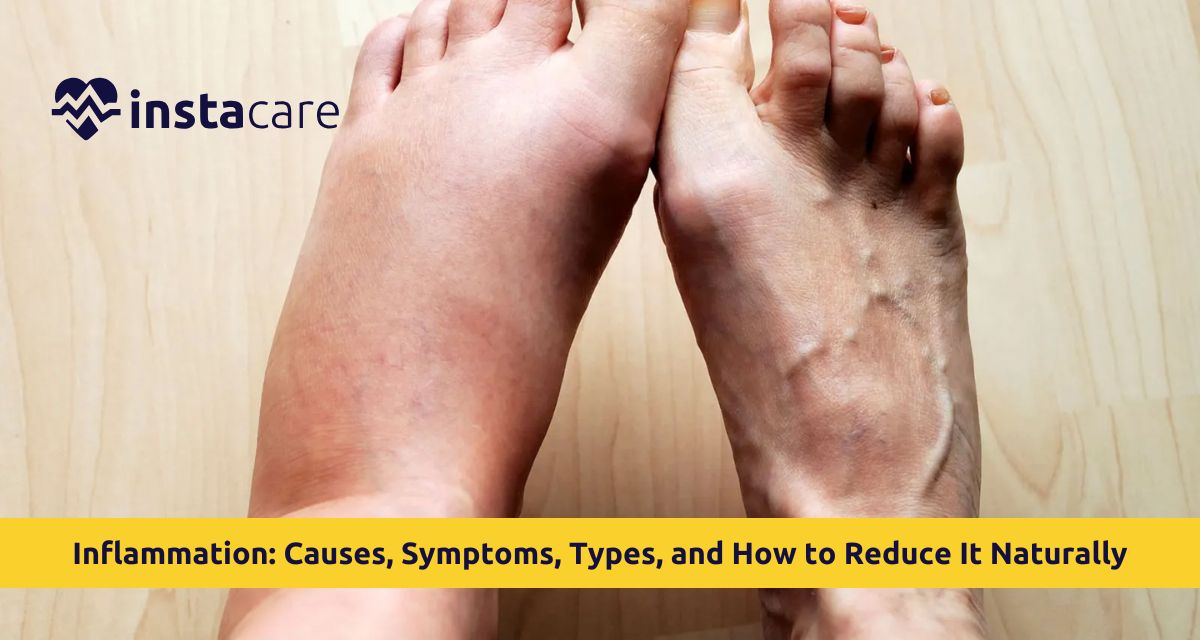People refer to inflammation more or less with each mention of chronic disease, arthritis, and the immune system. But what is it, really? Is inflammation ever a blessing, or is it even a blessing to the body's healing response? Literally, the body's protective response to injurious stimuli like infection, injury and toxins is inflammation. Inflammation is temporary, normal, even desirable but chronic inflammation is an angel-faced devil whose first suspect is most disease.
As dictated by the order of the remainder of these pages, all of the various forms, how to reduce inflammation, causes, symptoms, and consequences of inflammation in the body and how you avoid it and how it will heal so you can proceed to healthy pain-free living.
What Is Inflammation?
Inflammation is how the body reacts to invasion, damage, or infection, or invading invaders. When a body feels something that is toxic, it reacts by discharging white blood cells and chemicals into the damaged area to repair it.
Two forms:
- Acute inflammation: Short, beneficial, and a component of recovery.
- Chronic inflammation: Long-term and damaging, typically in diseases such as inflammation and arthritis, cardiovascular disease, and diabetes.
Master acute vs chronic inflammation and be in charge of your body.
Types of Inflammation
Acute Inflammation
Dies suddenly, typically following an infection, cut, or sprain. Redness, swelling, heat, and pain. Gets better within days or weeks.
Chronic Inflammation
Gets better with time and can last for months or years. May still increase without seeming to do any damage and is associated with systemic inflammation, where the body defense system attacks healthy tissue unnecessarily.
Clinical manifestations of chronic inflammation:
- Chronic fatigue
- Arthralgias
- Fuzzy thinking
- Abdominal pain
- Emotional adaptation
Causes of Inflammation
There are several causes of inflammation within and outside the body:
- Infections: Bacterial infection, viral infection, or fungal infection
- Trauma: Sprain, bruising, or cutting
- Malnutrition: Trans fat, high sugar, and processed food
- Sedentary lifestyle
- Obesity
- Chronic stress
- Alcohol and smoking
- Autoimmune disease
- Environmental toxins
They recur and can establish body-wide low-grade inflammation, leading to serious medical diseases.
Symptoms of Inflammation
symptoms of inflammation by location and type. Acute inflammation has classic signs characterized below:
- Redness
- Swelling
- Heat
- Pain
- Disruption of function of the affected tissue
Signs of chronic inflammation is more insidious and entails:
- Chronic fatigue
- Stiffness in the joints
- Headache
- Rashes on the skin
- Gastrointestinal disturbance
- Weight loss or gain
If you're showing these on a repetitive cycle, then one would think it is time to search for underlying inflammation and disease.
How Inflammation Damages the Body
Inflammation is healthy at the expense of self-repair, but chronic inflammation does so much damage. It's the biggest villain in the pathology of nearly all chronic diseases.
A few examples of disease and illness caused by inflammation include:
- Arthritis: Joints inflammation and pain and stiffness.
- Cardiovascular disease: Arteries inflammation with risk of heart attack.
- Diabetes: Insulin failure on a chronic basis due to inflammation.
- Alzheimer's: Brain inflammation.
- Cancer: Chronic inflammation will probably cause cell mutation.
You must monitor how the inflammation and immune system interact because if the immune system becomes over-stimulated or confused, it will kill off excess cells and cause more damage than good.
Diagnosis of Inflammation
Doctors utilize some of these drugs and inflammation markers on laboratory tests in trying to determine if your body is inflamed. Some of the tests that are pretty routine are
- C-reactive protein (CRP): Indirect marker of inflammation.
- Erythrocyte Sedimentation Rate (ESR): Inflammiac activity tests.
- Fibrinogen: Inflammation-related protein in blood.
- White Blood Cell Count: White count elevation signifies infection or inflammation.
Imaging studies (e.g., MRI, CT scan) also quantify inflammation of joints or organs, e.g., arthritis or inflammatory bowel disease.
Reversing and Controlling Inflammation?
A little bit of everything is necessary to control the inflammation: body movement, change in lifestyle, and change in diet. Start here:
An Anti-Inflammatory Diet
Diet too has a role in reducing inflammation. Eat plenty of:
- Anti-inflammatory foods: Leafy greens, nuts, olive oil, oily fish, berries, and turmeric
- Diet at least as much to prevent: Fried, processed, sugary drinks, and processed carbohydrate
Natural anti-inflammatory foods or drugs such as ginger, green tea, and omega-3 fatty acids can prove to be of additional value.
Physical exercise
Daily physical exercise lowers the degree of inflammation and maintains immune function. Ensure at least 30 minutes of exercise on 5 days a week.
Reducing stress
Stress causes inflammation. Mindfulness, deep breathing, yoga, or journaling might keep cortisol at some minimal level.
Sleep
Your body heals and detoxifies at night. Lack of sleep is actually directly linked to rising inflammation.
Medications and Treatments
Depending on your diagnosis, your doctor can write you:
- NSAIDs (like ibuprofen) for pain
- Corticosteroids for autoimmune flare
- Disease-modifying drug for diseases like rheumatoid arthritis
Talk to your doctor before starting any regime of inflammation treatment or supplements.
Prevention of Chronic Inflammation
Prevention is always the best option in anti-inflammation. A healthy lifestyle will ensure that chronic inflammation and related risk of disease can be reduced safely.
Healthy weight is also crucial because any excess body fat will produce pro-inflammatory chemicals. Avoidance of cigarettes and alcohol also prevents toxin accumulation and oxidative stress in the body.
There should be blood glucose regulation also, i.e., in the diabetic or prediabetic individual as inflammation is caused by excess of insulin. Hydration at proper levels should also be ensured as the body's natural detox and immune homeostasis mechanism would be ravaged by dehydration.
Nourishment foods also cry out. Avoid toxin intake such as plastics, chemicals, and pollution. Adopt fully natural cleaning agents at home and for the household and minimize single-use plastic use as far as possible.
Healthy gut:
- Full of probiotic food and fiber
- The immune system is nourished
- Inflammation reduces.
Prevention becomes more important in patients with a well-established history of
autoimmune or inflammatory diseases. Healthy lifestyle from the very start ensures your overall long-term health and decreases your chances of becoming a victim to life-threatening harmful complications.
Conclusion
Inflammation is not good and bad. Acute is healing but chronic will silently ruin your health in the long run. Having things done in your mind, being aware of the danger signs, and acting upon them will be the difference between good health and sickness. From diet and lifestyle adjustments to medication and herbal supplementation, there are numerous ways of maintaining your body's own repair process in tact.
Here your symptoms, get it done for you, and institute the proper changes to take control of any chronic disease. Provides guidance in the right direction, inflammation can translate into less pain, more energy, and longer, healthier living.
Please book an appointment with the
best Rheumatologist in Lahore, Karachi, Islamabad, and all major cities of Pakistan through
Instacare, or call our helpline at 03171777509 to find a verified doctor for your disease.




